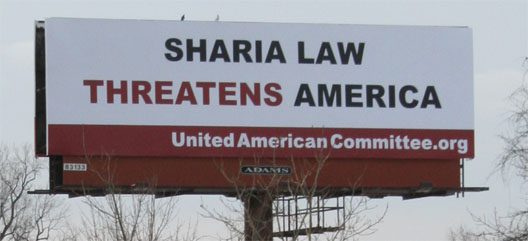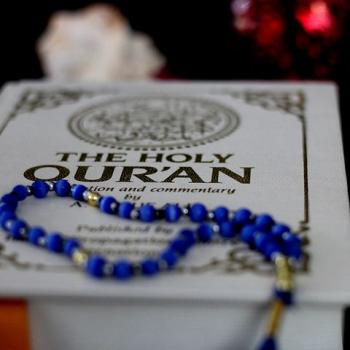For many in the America (and Europe) today, Sharia means Islam is taking over the west, evoking fear- fear of a 6th century-style system taking over. The fear-mongering is even more prevalent during the election cycles to benefit the ultra conservative, and not- so- conservative candidates. In some cases, the fear mongering actually has worked. Then there are organizations and websites actively promoting Islamophobia and Sharia-phobia. Many bloggers’ main business is to ‘warn’ people of the Sharia Creep, such as this one from 2017.
If and when we wake up one day in the West to find the Bible banned, churches shut down, and sharia police roaming the streets to enforce strict compliance to the religion of peace, one thing will be certain: some of us have been warning about such things for a very long time, but sadly such warnings mostly fell on deaf ears.
The media reinforces the fear by focusing on the negative stories. a 2015 analysis of media coverage in America and Europe found that over 80% of stories on Islam were negative.
A detailed account of who is behind the fear mongering will be the subject of my next blog, but here I would like to dispel a few myths about sharia.
The term “Sharia law” is a misnomer because sharia is not actually a law or a universally-defined legal code, but a set of guiding principles to living a moral life set out in the Quran.[1]
Myth #1
Sharia means Islamic Law
Sharia is an Arabic word meaning “path to the water,” or simply ‘the way’.
Sharia does not mean “Islamic law,” and Sharia and Islamic law are not the same. Sharia is a code of conduct and refers to the principles, values, and objectives derived from the Quran and Sunnah (Prophet Muhammad’s sayings and teachings). Sharia provides guidance on how to live an ethical life. It lays down guidelines on how to pray and how to treat one’s family members, neighbors and those who are in need.
Sharia addresses both personal and communal aspects of life.
Personal issues include acts of worship, e.g. daily obligatory prayers, fasting and performing Hajj (pilgrimage to Mecca). Communal issues are private matters such as marriage and divorce. It also governs issues pertaining to justice, protection of life and property, inheritance, religious rituals and charitable acts and care for the marginalized.
Then there is the public application of the Sharia, something that we see in Muslim-majority countries such as Saudi Arabia and Iran, and does not pertain to United States.
One should distinguish Fiqh from Sharia. Islamic law or Fiqh, is the Islamic jurisprudence, a human interpretation of how Sharia should be applied to today’s life, therefore Islamic law is subject to divergent views.
Myth #2
Sharia is religious law unique to Muslims
Not true. Most religions have sacred laws or religious standards for the different areas of life. A great example is the halakhah observed by religious Jews. There are many parallels between sharia and halakhah, including the myth that halakhah means “Jewish law”.
The word “halakhah” is usually translated as “Jewish Law,” although a more literal (and more appropriate) translation might be “the path that one walks.” [2]
In fact in many Arabic speaking countries, the law of Moses is simply known as Shariatul Musa.
And if you read the Arabic translation of the Bible for the Golden Rule, you will find the sharia there too.
“Do to others whatever you would like them to do to you. This is the essence of all that is taught in the law and the prophets. Matthew 7:12
فَبِالكَيفيَّةِ الَّتيْ تُحِبُّ أنْ يُعامِلَكَ الآخَرُونَ بِها، هَكَذا عَلَيكَ أنْ تُعامِلَهُمْ. هَذِهِ هِيَ خُلاصَةُ شَرِيعَةِ
مُوسَى وَتَعلِيمِ الأنبِياءِ
The word highlighted above is pronounced ‘sharia’(of Moses).
Myth #3
Muslims want to impose Sharia in America
Really?
Since 2010, 201 anti-Sharia law bills have been introduced in 43 states. In 2017 alone, 14 states introduced an anti-Sharia law bill, with Texas and Arkansas enacting the legislation.[3]
This is a result of fear mongering, demonization and politicizing the issue.
The irony is that no Muslim or Muslim organization has ever tried to implement Sharia to replace the Constitution or the American legal system.
Also realize that Muslims form about 1% of the American population. The vision portrayed by the blogger I mentioned at the outset, is far from realistic, if not downright dishonest. The USA Muslim population may be 1% overall, but in many of the states where the anti-sharia legislation has been introduced (many of them run by the right wing politicians), the Muslim population is substantially less than 1%, yet the fear mongers are successful in passing these bills in many states.
American Muslims practice Sharia on a voluntary, private basis in a manner similar to Catholics who obey the magisterium or Jews who follow halakhah. The essential parts of Sharia are practices such as daily prayers, fasting during the month of Ramadan, marriage contracts, and rules for charity and investments. Muslims follow these practices without infringing on anyone else’s rights. For example, if a Muslim eats a halal or kosher hamburger, nothing prevents someone else from eating a bacon cheeseburger![4]
Muslims have lived as minorities in non-Muslim societies since the beginning of Islam — from Christian Abyssinia to imperial and communist China. Do you see Islam or Sharia ‘taking over’ these countries?
Myth#4
Muslims have to choose between Sharia, or American Constitution/law
Sharia requires Muslims to obey the law of the land of the country they live in. American Muslims, like rest of the country, follow the constitution as their legal guide. Sharia requires American Muslims to support and follow the Constitution in all matters related to public law.
For example, in order to get married Islamically, in addition to be legally married, Muslims perform Nikah/Aqd, a religious ceremony that unites the husband and wife, invoking God’s name and blessings. This does not mean that the Muslims will only perform Nikah and bypass the US legal requirements for the marriage. Similarly, an American Muslim may seek the Islamic divorce but they are still bound to follow the state and federal laws pertaining to legal separation and divorce.
Conversely, alcohol and gambling (in many states) may be legal in America, but according to the Islamic sharia, they are forbidden, therefore most Muslims avoid drinking and gambling. That is a matter of personal choice.
Myth#5
Sharia is law of the land in Muslim Countries
This is not a total myth and is at least partly true. While it’s true that sharia influences the legal codes in many Muslim-majority countries, those codes have been shaped by European colonialism. France, England and others imposed nation-state models on nearly every Muslim-majority land. In pre-modern Muslim lands, religious fiqh authority was separate from the governing authority.
Many right wing Islamic parties and groups in Muslim majority countries continue to demand to merge the secular legal code with sharia, thereby deviating from centuries of practice of separating the two.
It must also be remembered that the Quran calls for no compulsion.
There is no compulsion in religion. 2:256
The truth is that sharia and its implementation and/or interpretation has been troublesome in many Muslim majority country. But Islamic scholars also point out that these ‘laws’ have been misinterpreted and have no place in sharia, for example women having no rights to drive in Saudi Arabia (recently redacted), or not able to run for president or watch a soccer game in Iran. And there are these reports of abuse at the personal level, which has its roots more in the culture rather than sharia itself. John Esposito of Georgetown University, a prominent scholar and champion of Christian-Muslim dialogue, (who also wrote a testimonial to my last boo, The Three Abrahamic Testaments) points out that these man-made interpretation should change.
While these principles and objectives do not change, what can—and should—change is Islamic law, or jurisprudence (fiqh), which is the human elaboration of how those values and objectives are to be put into practice concretely.
https://blog.oup.com/2018/07/shariah-myths-vs-realities/
And the extremist/terror groups, such as ISIS or Taliban have not helped, trying to implement their own extreme version, which has been opposed by a very large majority of Muslims.
Myth#6
Sharia is uniform code for all Muslims/accepted by all Muslims
As I noted earlier, there is no single sharia codex that shapes Muslim lives. There are divergent views even within the religious scholars. Most average Muslims are fairly naïve when it comes to how the sharia applies to the religious and social practices.
Even the fiqh, or Islamic jurisprudence is not uniformly accepted. There are at least five major school of thoughts- four within the Sunni Muslims (Hanafi, Shafaiy, Hambali and Maliki)and the one that is followed by Shia Muslims (Fiqh e Jafaria). It must be emphasized that the core beliefs and views in all major school of thoughts are same, or very similar. The differences are in the interpretation of how the divine law is applicable to daily personal and social life and religious rituals.
So why do we have so many myths and misconception and who is creating all the fuss?
That is a million dollar question. In my next post, I will describe the Sharia in more depth, and shed more light behind the anti-sharia movement in America. I would state here that the anti-Sharia movement and legislation is part of a larger campaign sponsored and funded by an organized Islamophobia network.
Islamic Network Group, ING, has a nice FAQ on this subject on their website (link#4 below).
[1] https://www.splcenter.org/hatewatch/2018/02/05/anti-sharia-law-bills-united-states
[2] http://www.jewfaq.org/halakhah.htm
[3] https://www.splcenter.org/hatewatch/2018/02/05/anti-sharia-law-bills-united-states
[4] https://ing.org/a-closer-look-at-sharia-in-the-united-states/













